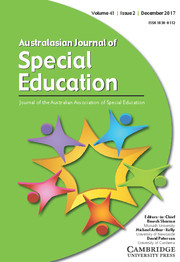Article contents
A Model for Effective Classroom Discourse: Predicated Topics with Reduced Verbal Memory Demands
Published online by Cambridge University Press: 26 February 2016
Abstract
School failure often stems from a mismatch between the language used by children and the language used in schools. Central to the mismatch is the fact that schools use “extended texts” (i.e., long stretches of language that expound a topic). Extended texts impose major and unique language processing demands that are unfamiliar to many children. At the same time, these texts cannot be abandoned since they are central to the school’s educational mission. However, it is possible to modify the form they have commonly taken. This form, developed to meet the constraints of a prior time, is marked by dual disadvantages: a) it emphasizes memory for details, a skill that is problematic in many language disabled students and b) it is based upon “isolated” decontextualized concepts that do not support coherent discussion. This paper offers an alternative model for classroom text which involves the use of a) memory aids (i.e., materials to reduce the need for recall of verbal details) and b) “predicated topics,” (i.e., patterns for structuring conceptual information in a predictable and relevant manner).
- Type
- Research Article
- Information
- Copyright
- Copyright © The Australian Association of Special Education 1992
References
- 1
- Cited by


